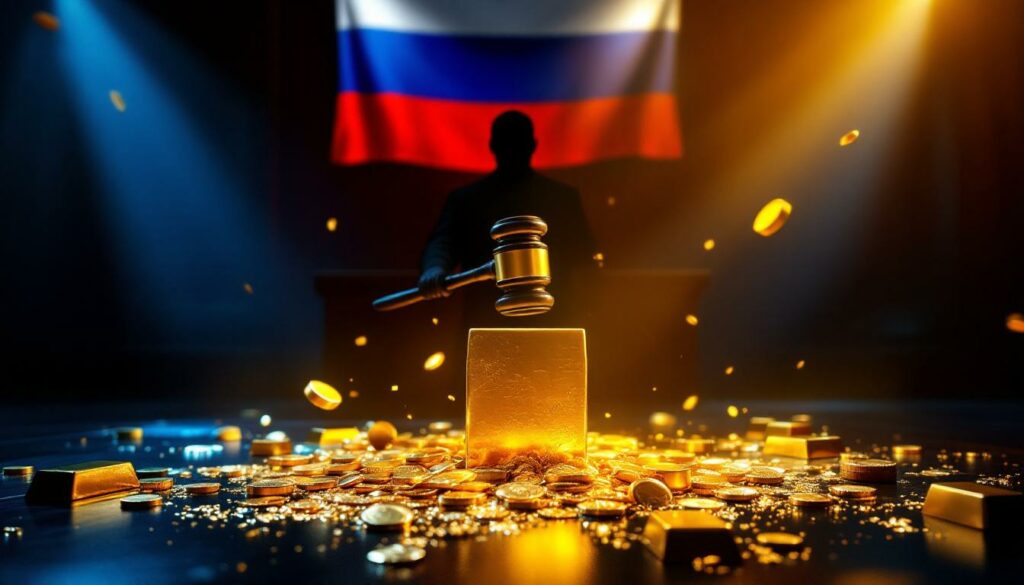Russia's Strategic Seizure of Uzhuralzoloto: Legal Battle for Control of Gold Assets
Russia's Prosecutor General has filed a lawsuit seeking to transfer ownership of billionaire Konstantin Strukov's shares in Uzhuralzoloto (UGC) to the state, marking a significant escalation in the government's campaign to nationalize strategic assets. This legal action, reported on July 3, 2025, targets Russia's fourth-largest gold producer in what appears to be the latest move in a series of high-profile asset seizures.
The lawsuit has sent shockwaves through Russia's mining sector and raised further questions about the security of private ownership in strategic industries within the country. With preliminary hearings scheduled for July 8, 2025, the case represents a pivotal moment for Russia's gold market performance and broader economic policy.
Key Details of the Lawsuit
The Prosecutor General's filing directly targets Strukov's controlling stake in UGC, alleging that he "illegally obtained control" of the company, according to reporting by Kommersant. This legal mechanism—using allegations of improper acquisition rather than direct expropriation—provides a judicial framework for what effectively amounts to state takeover.
When contacted by reporters, the Prosecutor General's office declined to provide immediate comment on the proceedings, further adding to market uncertainty surrounding the case.
The preliminary hearing has been fast-tracked and is scheduled for July 8, 2025, indicating the government's sense of urgency in securing control of this strategic asset.
Market Reaction to the Legal Action
UGC shares plummeted 17% immediately following the announcement, reflecting investor alarm at the prospect of state intervention. By 0829 GMT on the day of the announcement, the shares had recovered slightly but remained down 9.4% as markets digested the implications.
The significant market reaction underscores the perceived gravity of the situation, with investors recognizing the lawsuit as part of a broader pattern of state intervention in private business rather than an isolated incident.
Industry analysts note that UGC's stock had already been under pressure due to its status as a sanctioned entity in the United States, making it particularly vulnerable to negative sentiment.
Who is Affected by Russia's Gold Producer Takeover Attempt?
The case has far-reaching implications for stakeholders across Russia's mining sector and raises alarm bells for both domestic and international investors in Russian natural resources.
Profile of Konstantin Strukov
Konstantin Strukov, the Russian billionaire and majority owner of Uzhuralzoloto, now finds himself in the crosshairs of his own government despite his significant contributions to Russia's gold sector.
Strukov has been under Western sanctions for his alleged support of the Russian government. British authorities specifically cited his work in the Russian extractives sector as directly supporting state interests—an ironic position given the current situation where the Russian state itself is now targeting his assets.
The allegations that he "illegally obtained control" of UGC, as reported by The Moscow Times, form the legal basis for the attempted state seizure, though the specific nature of these allegations remains unclear in public reporting.
Uzhuralzoloto's Position in the Market
As Russia's fourth-largest gold producer, UGC plays a vital role in the country's precious metals sector. The Moscow-listed company contributes significantly to Russia's annual gold output, which reached approximately 330 tonnes in 2024 according to industry estimates.
The company holds strategic importance to Russia's domestic gold industry, particularly as the country has increasingly relied on gold reserves to shore up its financial position following Western sanctions.
UGC's operations currently face dual challenges: restrictions from U.S. sanctions that limit its international business activities and now potential state takeover that threatens its current ownership structure.
Why is Russia Seizing Domestic Assets?
The UGC case represents part of a broader trend of increasing state control over strategic sectors in Russia, with prosecutors dramatically stepping up seizures of domestic assets through court proceedings throughout 2025.
Pattern of Increasing State Control
In recent months, Russian authorities have seized control of a leading grain trader, Moscow's Domodedovo airport, and strategic warehouse assets—all through similar legal mechanisms.
This pattern represents a significant shift in tactics. Initially following Russia's Ukraine invasion in February 2022, the government focused primarily on foreign companies' assets, but attention has increasingly turned toward domestic Russian businesses as well.
Prosecutor General Igor Krasnov has been leading efforts to seize property worth an estimated 2.4 trillion rubles ($30.46 billion at current exchange rates), demonstrating the massive scale of this asset consolidation campaign.
Strategic and Economic Motivations
The Russian government has consistently cited "strategic stability" and "domestic security" as justifications for these seizures, framing them as necessary measures to protect national interests.
"These actions reflect a fundamental shift in Russia's economic policy, prioritizing direct state control over critical resources rather than market-based approaches," notes a Reuters analysis of the situation.
Gold production in particular is viewed as strategically important for Russia's economic sovereignty, especially as the country faces continued international sanctions and seeks to reduce dependency on the global financial system.
Geopolitical Context
This intensifying seizure program began in earnest after Russia's Ukraine invasion in February 2022, which triggered unprecedented Western sanctions that froze approximately $300 billion in Russian foreign currency reserves.
With roughly 23% of Russia's $581 billion pre-war reserves held in gold, the precious metal has become increasingly important as a sovereign asset that cannot be easily sanctioned or frozen by foreign powers.
The initial focus on foreign companies' assets has evolved into a more comprehensive program that now targets domestic Russian businesses as well, signaling a fundamental realignment of Russia's economic structure in response to international isolation.
How Does This Fit Into Russia's Broader Gold Strategy?
Russia's move to secure control of UGC aligns with a larger strategic pivot toward gold as a pillar of economic security in an era of geopolitical uncertainty.
Gold's Importance to Russia's Economy
Gold serves as a critical resource for maintaining Russia's financial reserves, particularly as Western sanctions have limited access to foreign currency markets and frozen significant portions of the country's overseas assets.
The Central Bank of Russia has steadily increased its gold holdings since 2014, with particular acceleration following the 2022 Ukraine invasion. This accumulation provides an alternative to frozen foreign currency reserves and represents a hedge against international sanctions.
Domestic production control provides economic security by ensuring a steady supply of gold that can be added to national reserves without relying on international markets where Russia faces increasing restrictions.
Impact on Russia's Gold Industry
The UGC case creates significant uncertainty for private operators in Russia's gold sector, who must now consider the possibility that their assets could be next in line for state acquisition.
The move signals potential for further nationalization of mining assets, particularly those deemed strategically significant or owned by individuals who have fallen out of favor with authorities.
This climate of uncertainty may deter private investment in Russian gold production at a time when the sector requires capital to maintain and expand operations.
For the gold industry specifically, consolidation of state control represents a fundamental restructuring away from the post-Soviet privatization model that had previously dominated.
International Implications
The seizure attempt further isolates Russia's gold sector from global markets, reinforcing its position as an internally-focused industry primarily serving national interests rather than international investors.
Western concerns about Russian business practices will only be amplified by these developments, potentially leading to additional sanctions or restrictions on Russian gold in international markets.
The impact on global supply chains may be significant, as Russia accounts for approximately 10% of global gold production. Any disruption to this output could influence world gold prices analysis and availability.
What Are the Risks for Businesses Operating in Russia?
The UGC case highlights the evolving risk landscape for both domestic and international businesses with Russian operations.
Legal Vulnerabilities for Domestic Companies
Private businesses now face increased risk of state intervention through court proceedings, particularly those in sectors deemed strategically important.
The vulnerability to allegations of improper acquisition creates a precarious position for many companies, as historical privatization processes in Russia were often complex and potentially open to legal challenge.
Limited legal recourse exists against state actions, with courts generally deferring to government interests in cases involving "strategic assets" or "national security" concerns.
The precedent of successful state seizures of major assets—from airports to agricultural businesses and now potentially a major gold producer—establishes a troubling pattern that could extend to other sectors.
Warning to Foreign Investors
Prosecutor General Krasnov has explicitly stated that returning foreign companies would be "watched closely" to ensure Russia "benefited" from their operations—a clear warning that even international businesses face scrutiny.
This creates an unpredictable legal environment where business decisions might be judged retroactively against evolving standards of national interest.
The political risk factors for investment in Russia have escalated dramatically, with property rights increasingly contingent on maintaining government favor.
"Foreign investors must now factor in not only Western sanctions risk but also the possibility of Russian state intervention when evaluating Russian opportunities," notes a Reuters analysis.
Business Climate Implications
The deterioration in protection for private property rights represents a fundamental shift away from market economy principles that had been gradually established in the post-Soviet era.
Russia appears to be moving decisively toward a state capitalism model where major industries are either directly controlled by the government or operate under close supervision with limited autonomy.
Businesses face increased compliance burdens to demonstrate their alignment with national interests and strategic goals rather than purely commercial objectives.
Political connections have become increasingly essential for business security, creating potential corruption risks and barriers to entry for new market participants.
What's Next for Russia's Asset Nationalization Program?
The trajectory of Russia's asset seizure campaign suggests continued expansion into additional sectors deemed strategically important.
Upcoming Developments in the UGC Case
The preliminary hearing scheduled for July 8, 2025, will provide the first indications of how courts will approach this high-profile case.
Strukov may attempt legal challenges based on legitimate acquisition of his stake, though Russian courts have generally sided with the state in similar proceedings involving strategic assets.
A negotiated settlement remains possible, potentially allowing Strukov to retain some ownership or management role in exchange for ceding majority control to state entities.
The outcome will have significant implications for other gold producers in Russia, potentially serving as a template for additional hostile takeover strategies in the sector.
Potential Targets for Future Seizures
Other privately-owned natural resource companies, particularly in gold, oil, and strategic minerals, may face similar legal actions based on the UGC precedent.
Strategic infrastructure assets—including ports, transportation networks, and communications systems—represent likely targets for continued state consolidation.
Companies with sanctioned ownership or management could be particularly vulnerable, as their international restrictions provide a potential justification for government intervention.
Businesses in sectors deemed critical to national security, from technology to agriculture, should be prepared for increased scrutiny and potential state action.
Long-term Economic Outlook
The continued consolidation of state control over strategic sectors points toward a fundamentally different economic model for Russia—one more focused on security and sovereignty than growth and efficiency.
Foreign investment in Russian businesses will likely remain depressed given the heightened political and legal risks, further isolating the economy from global financial systems.
The emphasis on self-sufficiency in key industries may provide some insulation from sanctions but at the cost of reduced competitiveness and innovation in the longer term.
Russia's gold industry specifically may see reduced production efficiency under state management, though output levels could be maintained through increased investment from government sources.
FAQ: Russia's Seizure of Gold Assets
Is this seizure related to Western sanctions?
While not directly stated in the lawsuit, Russia has increasingly moved to secure strategic assets since Western sanctions were imposed following the Ukraine invasion. The targeting of sanctioned individuals like Strukov suggests a connection to the broader geopolitical context. The move appears designed partly to ensure that sanctions cannot prevent Russian authorities from controlling vital gold production.
How much is Uzhuralzoloto worth?
The exact valuation isn't specified in public reports, but as Russia's fourth-largest gold producer, it represents a significant asset in the country's mining sector. The 17% share price drop following the lawsuit announcement indicates substantial market value. Based on production volumes and gold driving highs analysis, industry analysts estimate UGC's worth in the billions of dollars.
Are other gold producers at risk of similar actions?
Based on the pattern of strategic asset seizures, other privately-owned gold producers in Russia face similar risks, particularly those with ownership structures that could be challenged or owners under Western sanctions. Companies like Highland Gold Mining and other mid-tier producers may need to evaluate their vulnerability to similar legal mechanisms.
What happens to Uzhuralzoloto's operations if the state takes control?
If the state gains control, operations would likely continue under government oversight. Russia has demonstrated interest in maintaining production of strategic resources while bringing them under state influence. Management may be replaced with state-appointed officials, and production targets might be adjusted to align with national strategic goals rather than purely commercial considerations.
How does this compare to other resource nationalizations globally?
Russia's approach differs from traditional nationalizations by using legal mechanisms alleging improper acquisition rather than direct expropriation, creating a judicial veneer for what effectively amounts to state takeover of strategic assets. This contrasts with more direct nationalization models seen in countries like Venezuela and Bolivia, though the end result—increased state control—is similar.
Disclaimer: This article contains analysis of developing legal proceedings and market conditions. The situation may evolve rapidly, and readers should consult multiple sources for the most current information. The economic and political assessments presented represent interpretations based on available information and should not be considered investment advice.
Want to Capitalize on the Next Major Mineral Discovery?
Don't miss out on potential high-growth opportunities like the ones discussed in this article. Discovery Alert's proprietary Discovery IQ model provides real-time notifications when significant mineral discoveries are announced on the ASX, giving you a crucial market advantage. Explore historic returns from major discoveries at https://discoveryalert.com.au/discoveries/ and position yourself ahead of the market.




